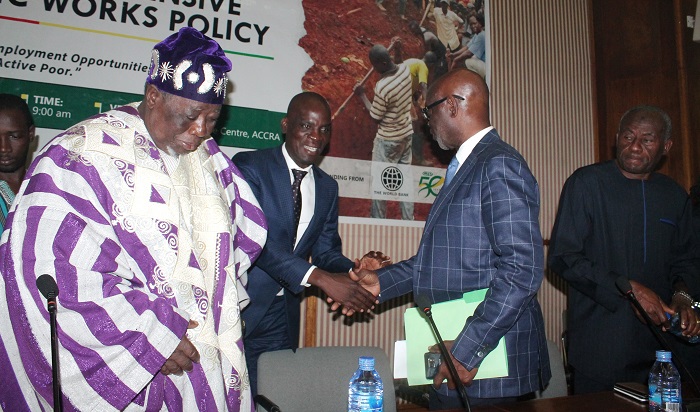
Ghana needs 300,000 jobs annually to resolve youth unemployment
Ghana's economy needs about 300,000 new jobs yearly between now and 2020 if the country is to avoid increasing unemployment in both the rural and urban areas.
Advertisement
“Job creation and job sustenance, which continue to plague many countries, are key to promoting development and eradicating poverty,” the World Bank has said.
The Senior Country Officer of the World Bank, Ghana Office, Dr Beatrix Allah-Mensah, made this known at the launch of the National Labour Intensive Public Works (LIPW) Policy in Accra yesterday.
The policy seeks to create income-generating opportunities for the rural and urban poor to reduce extreme poverty.
“It is estimated that 48 per cent of the youth between 15 and 24 years do not have jobs”, the World Bank, in a report this year on jobs in Ghana, has said.
The LIPW is a social protection programme by the government to provide employable vocational and technical skills for the unskilled and semi-skilled labour force in the country.
Pilot project
Introduced as a five-year pilot project in 40 districts in 2011, LIPW is currently being implemented in 60 districts under the World Bank-funded Ghana Social Opportunities Project (GSOP).
Currently, the project has provided 160,627 short-term employment to extremely poor persons, 61 per cent of whom are females.
Dr Allah-Mensah said access to jobs was even more crucial in rural areas and for the poor, thus making job security a social protection issue.
She said public works programmes contributed significantly to addressing such challenges through the provision of temporary employment, mostly for unskilled manual workers.
She said a systematic and coordinated approach was needed to ensure that the economically active poor in the country gained access to the employment and training they needed.
The World Bank, she said, had supported the government of Ghana technically and financially in the implementation of LIPW to the tune of $138.6 million.
Public works and poverty reduction
The Chairman of the National Development Planning Commission (NDPC), Professor Kwesi Botchwey, who launched the policy, said employment was one of the critical instruments for poverty reduction and recovery from human and natural crises, saying without employment, it will be difficult to achieve any of the Sustainable Development Goals (SDGs) set out by the United Nations.
He said although the government over the years had achieved a lot in the area of infrastructural development and the provision of social amenities, “there are more opportunities to expand and hasten our pace of development and improve the living conditions of the vast majority of Ghanaians within the broad frameworks of social protection, employment and local economic development.”
Prof. Botchwey called for coordination among ministries, departments and agencies (MDAs) in the implementation of the policy, and added that there was the need to ensure that all MDAs recognised and submitted to the implementation of the framework.
That, he said, was the only way to ensure that the project was sustained and replicated across the country.
Collaboration
The Minister for Employment and Labour Relations, Mr Haruna Iddrisu, in a welcome address, said LIPW was in fulfilment of his ministry’s mandate to sustainably reduce the proportion of young people not in employment, education or training by the year 2020.
He said the LIPW was being launched as the needed framework to ensure the maximum use of opportunities for the creation of decent jobs and also contribute to bridging the huge infrastructural gap that existed in the country.
Delivering his speech, the Minister of Local Government and Rural Development, Alhaji Collins Dauda, said the country stood to benefit enormously from the LIPW as a poverty reduction tool since it, among others, had the potential of addressing the migration of the youth from the northern part of the country to the south.
Naa Prof. John S. Nabila, a member of the Council of State and President of the National House of Chiefs, who chaired the launch of the policy document, called for more policies which would impact favourably on the people.
Advertisement
Writer's email: [email protected]




